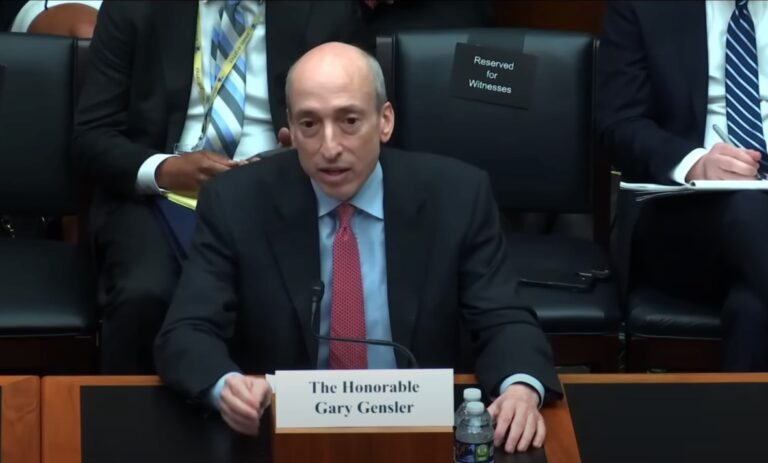On 27 September 2023, SEC Chair Gary Gensler appeared before the U.S. House Committee on Financial Services, where he was questioned by U.S. Congressman Patrick McHenry (R-NC-10). The exchange was intense, covering a range of topics from the classification of Bitcoin to the SEC’s compliance with document requests.
In his prepared testimony for this hearing, Gensler outlined his stance on cryptocurrency regulation. Gensler asserted that cryptocurrencies should not be exempt from U.S. securities laws, emphasizing that Congress intended a broad scope for these laws, covering various financial instruments under the term “investment contract.” He argued that most crypto tokens likely fall under this category and are thus subject to U.S. securities laws. This also means that crypto intermediaries, such as exchanges and brokers, must comply with regulations like Sections 5, 15(a), and 17A(b) of the Securities Exchange Act of 1934.
Gensler expressed concern about widespread noncompliance in the crypto industry, drawing parallels to the financial landscape before federal securities laws were enacted. He noted that the SEC has initiated enforcement actions and is actively involved in rulemaking for the crypto industry, including updates to investment adviser custody rules and clarifications on decentralized finance (DeFi) systems.
McHenry began his grilling of Gensler by reminding Gesler that in 2018 Gensler had said Bitcoin, Ether, Litecoin, and Bitcoin Cash were not securities. He specifically asked Gensler why he believes Bitcoin is not a security. Gensler referred to his past academic work at MIT, where he discussed the Howey Test—a legal framework used to determine if an asset is a security. He stated that Bitcoin does not meet the criteria of the Howey Test, which involves the public expecting profits based on the efforts of others.
McHenry pressed Gensler for a clear answer, asking if he still holds the view that Bitcoin is not a security. Gensler confirmed that he does not consider Bitcoin a security, aligning with the SEC staff’s previous statements.
The conversation then shifted to the regulatory landscape for digital assets. McHenry asked if legislative action is needed to protect consumers in the digital asset space. Gensler acknowledged that the Commodity Futures Trading Commission (CFTC), which he once chaired, lacks comprehensive authority to regulate Bitcoin and other digital commodities. He expressed support for Congress to grant more authority to the CFTC to fill this regulatory gap.
McHenry also questioned Gensler about the SEC’s compliance with document requests made by the committee. He expressed frustration over the SEC’s failure to provide non-public documents, despite a 10-week review process. Gensler stated that they have been working with the committee’s staff, but did not specify the nature of the documents provided. McHenry warned that the committee would take action if the SEC continues to be non-compliant.
Lastly, McHenry criticized Gensler for not conducting economic analyses for major rulemakings that could impact anyone who owns stocks, bonds, or any type of security. He emphasized that Gensler has serious questions to answer to both the public and Congress.
He finished by telling Gensler:
“You have serious questions to answer to the public and to Congress., and we intend to get your compliance. We can do it the easy way or the hard way.“









